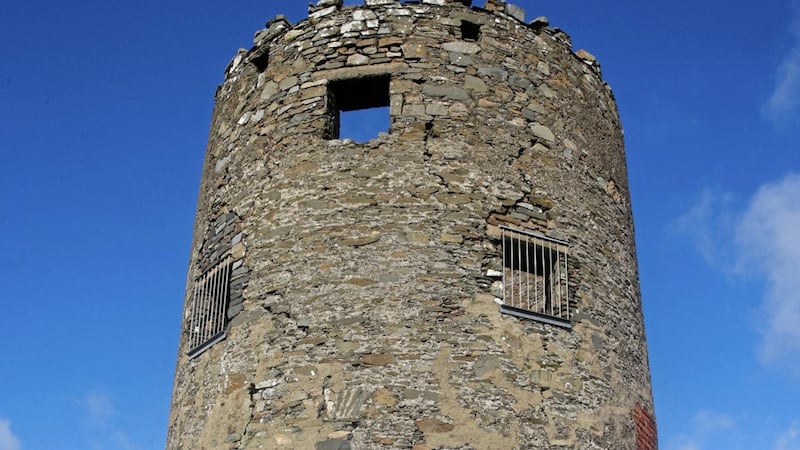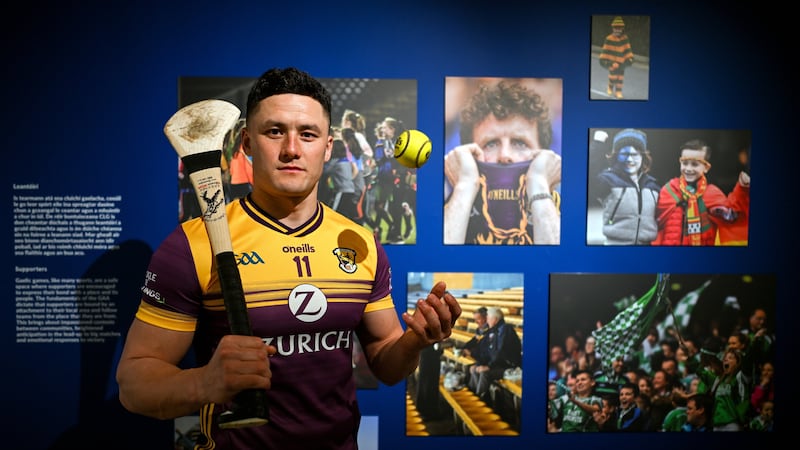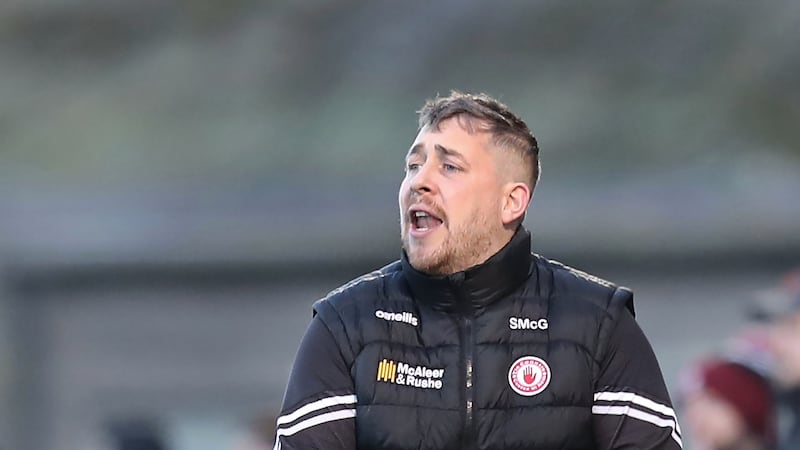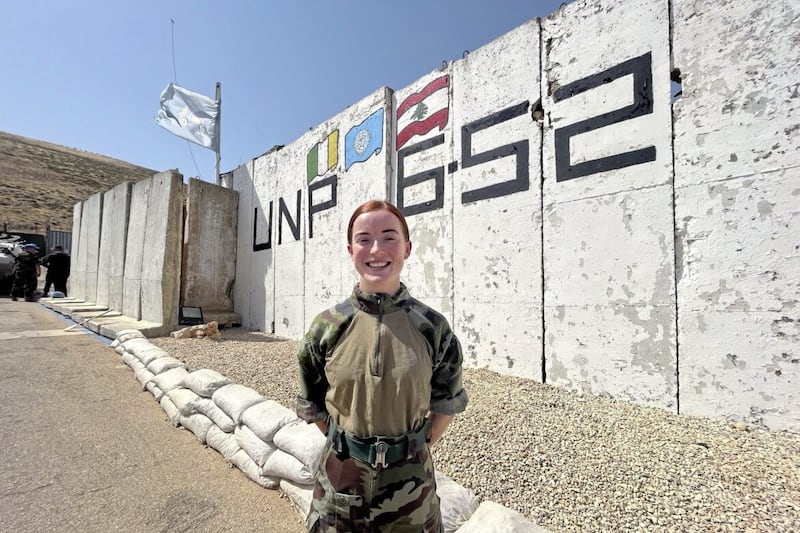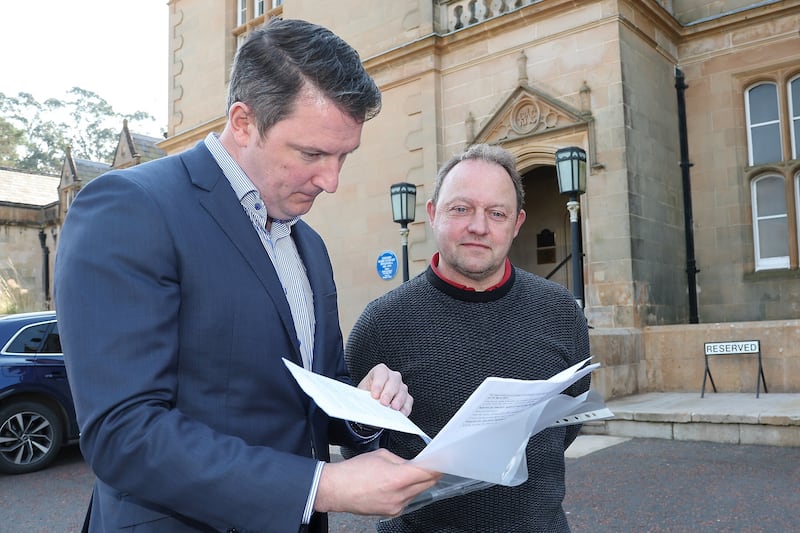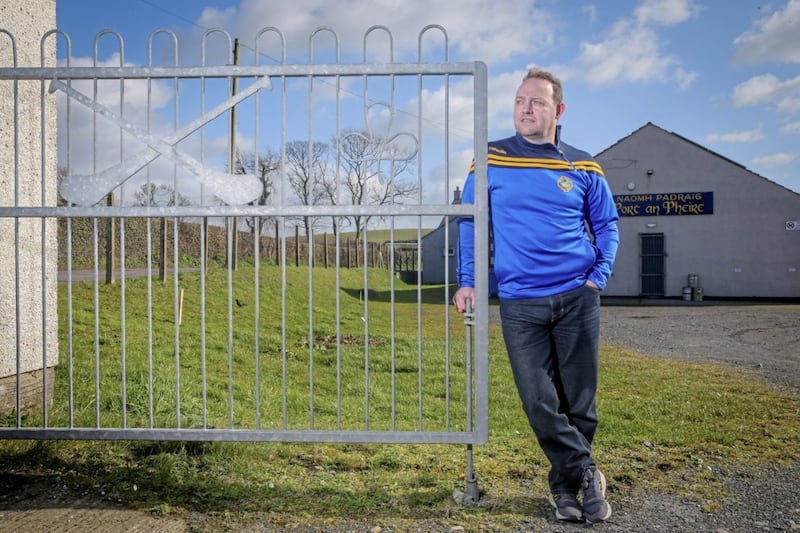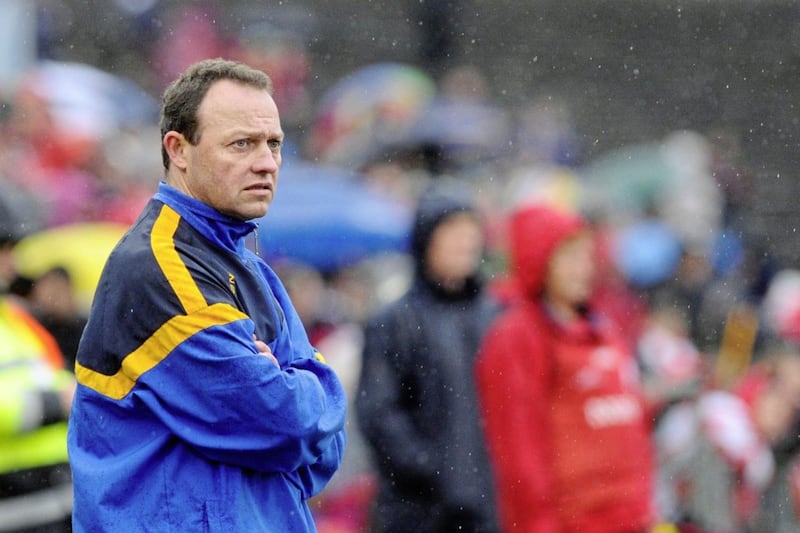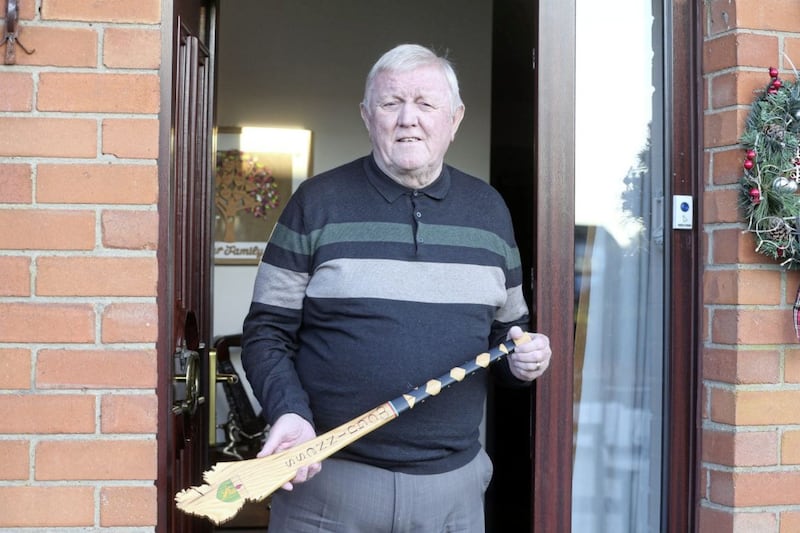In Part Two of an indepth interview casting an eye over his hurling career, Noel Sands reflects on his heart scare six years ago, beating Antrim in Ulster finals and keeping the small ball game alive on the Ards peninsula. The Portaferry man spoke to Brendan Crossan...
'Look Noel, you are having a heart attack. You’re going to the Royal. You’ll get into the operating theatre and it’ll be like Piccadilly Circus; there’ll be people running around with machines, but you need to remain calm.’ – Paramedic
JUNE 2, 2014. Almost six years on, everything remains crystal clear. It was as if Noel Sands was a spectator, with a ringside seat, of the whole dramatic event.
“I was having cold sweats at night and was wakening up. I knew something was working on me.
“On the 2nd of June, the day before Anne’s birthday, I came down the road. When I got home I ran upstairs with her birthday present and came back down and said to Anne: ‘I don’t feel good. I think I’ve got indigestion.’
“I had every reaction you’d have before a heart attack – it started off with indigestion, numbness in my left arm, sweats, and when I went outside for fresh air I was trying to be sick. I lay up against the wall and had to shout for help. I couldn’t get up.
“I said to Anne: ‘There’s something wrong with me.’”
He knew what was happening, but he still couldn’t process it.
A heart attack? Me? At 45?
Anne remained calm and got him down to the local doctor’s surgery in Portaferry.
Lying on a bench strapped to a defibrillator, he remembers reading what the machine was saying: ‘Stand clear. No charge initiated at this minute.’
“They gave me morphine and aspirin straight away. I could see the doctor, I could see Anne and everybody was talking around the room… You are kind of in a surreal situation, it’s like an out-of-body experience.”
Time was the only thing that didn’t add up that day. He doesn’t know how long he was waiting but an ambulance arrived and he was driven to the Royal Victoria Hospital.
A female paramedic kept him company in the back of the ambulance.
“That paramedic was very good. She said: ‘Look Noel, you’re having a heart attack and you’re going to the Royal and they’re going to sort it out for you. You’ll get into the operating theatre and it’ll be like Piccadilly Circus; there’ll be people running around with machines. But you need to remain calm.’”
Sands listened and computed the information.
“So when I got moved into theatre, people were rushing around just as the paramedic had told me, so she had prepared me.”
As he lay waiting, a nurse attempted to shave his chest hair, but it was excruciating.
‘What’s wrong with this razor?’ the nurse barked.
‘The batteries are dead.’
Instead of shaving his chest hair it was pulling it.
Sitting at his kitchen table, Sands’ dark humour kicks into gear as he re-tells the story.
“So they changed the batteries and it started working…
“They put something in my wrist and the next thing this guy came over to me and said: ‘You have to sign a waiver form in case the operation doesn’t go well.’”
Laughing hard at the memory, Sands says: “That was the last thing I needed to hear.”
“I could barely sign my name and I was thinking: ‘Am I going to die here? Is this it? Is this my last?’
“So I said to myself: ‘I better get religious!’ I said a few Hail Marys and a few Our Fathers to get me through it. The operation went like a dream and I was up in recovery a couple of hours later.”
One stent later he was sitting up in his bed.
As with all life-changing and life-affirming events, Sands retraced his own steps in an effort to explain to himself more than anything else why he’d ended up in cardiac unit.
He’d been suffering from gout since his mid-30s – a form of arthritis that causes swelling in joints.
His bouts of gout were sore-to-the-touch insufferable.
“In January of that year I was given anti-inflammatory tablets for the pain. I was eating the tablets like they were smarties. I was also training for the club’s Strictly Come Dancing fundraiser which was fairly physical because there were lifts in our routine.
“I’ve since said to Marie Austin, my dance partner: ‘You nearly killed me!’ In April of that year – Marty [Mallon], ‘Sambo’ McNaughton and ‘Woody’ McKinley got together to play a charity match between Antrim and Down and I played in that game… So all those things probably contributed to it.
“I was as shocked as anybody when I took a heart attack… Although people would say I’m not a stressful person, underneath the surface, I could be worrying about every wee thing.”
Later that year, Portaferry climbed the provincial summit by upsetting red-hot favourites Cushendall in the decider at Owenbeg.
Eoghan Sands, Noel’s eldest son, produced a virtuoso display, converting two sublime sideline cuts and bagging the all-important goal that toppled the Antrim champions.
“I had to take things easy,” Sands adds. “Our club won Ulster that year and I could feel myself wanting to get up and shout, but I could feel myself getting dizzy. I did feel weak for a time and I lost a bit of weight.”
The stent did its job and a couple of lifestyle tweaks later Sands is arguably in better health now than he was six years ago.
**********
JIMMY O’Reilly squeezed the last beads of sweat out of him before the Portaferry marksman retired from the inter-county scene in 2002.
But there would be no glorious encores in Ulster – ’92, ’95 and ’97 proved to be the revolutionary years before a brilliant Derry side, backboned by the imperturbable Ollie Collins, Geoffrey McGonigle, Kieran Stevenson, Colin McEldowney and John O’Dwyer, emerged to claim back-to-back crowns.
The Ardsmen did take Antrim’s scalp in a 2001 semi-final but the Oak Leafers pipped them in the decider by a point.
“Jimmy O’Reilly brought me back to the fold,” Sands says. “Jimmy was a lovely man. He could man-manage and he got people in around him that were able to train the team. We went out to New York in his first year and he made me captain. I was delighted to get a second opportunity [after being axed by former boss Frank Dawson] and gave it my all.”
Sands doesn’t carry many regrets, but there was one red card that still niggles him from the 2000 Ulster semi-final meeting with Derry.
Every time he took to a hurling field, Sands received special attention.
If you wanted to hurl, he’d hurl. If you didn’t want to hurl, Sands could do that too. He feared no-one.
But on this particular day Emmett McKeever got under his skin.
“I was coming towards the end of my career. Emmett was a good young player. It was Emmett’s marking style. I had boys do it before to me – they’re hitting you, kneeling you, shafting you – you can run around and get rid of them. But this guy stuck to me like glue.
“I hit him, he hit me, we were digging each other. This went on.
“So I said: ‘Right, here we go.’ I moved him out to the sideline, the ball went in over the far end of the field. What I didn’t look out for was the linesman.
“There were helmets then but no face guards and I smashed him right in the face. He got back up and whacked me across the face with his stick. I went down, got back up and I thought that would be the end of it, ‘Let’s start playing a wee bit of hurling now.’
Thinking he’d been cute about his actions, the linesman – who was Tommy McIntyre from Antrim – saw everything.
“Tommy was always a bee in my bonnet,” Sands smiles. “I’d be getting murdered in Antrim League games and Tommy would be saying: ‘Get up Sands – get up.’”
McIntyre relayed his eye-witness account of the Sands-McKeever altercation to referee Pat Aherne of Carlow.
Both players expected a yellow card apiece.
“He flashed the red to Emmett first and I thought: ‘F***’, and then he flashed the red at me… I thought: ‘Jesus, what have I done?’
“It was the loneliest walk I’ve ever done. I just didn’t know how to handle that situation. That was the first time that someone who had really harassed me to that degree. I’d a tendency to ram straight into things, trying to break barriers down instead of thinking: ‘Well, how am I going to do this?’”
Before their hearing in Croke Park, Sands told McKeever and Derry officials he would take the blame for the incident in the hope of freeing the defender to play in the Ulster final.
But subsequent BBC footage emerged and showed McKeever strike the Down forward.
Sands and McKeever’s best-laid plans were scuppered. McKeever missed out as Derry defeated Antrim by a point in the 2000 decider, as well as costing him a place in an All-Ireland quarter-final with Offaly.
**********
ON the subject of regrets, around that same period, the Portaferry club was still badly fractured from an internal dispute of several years previous over the committee’s decision to present a local RUC officer with a retirement gift.
The committee thought it was doing the right thing by acknowledging the officer’s work in the village over a long period of time, while many members thought the gesture was misplaced and left the club open to ridicule.
Although there was a peace process, the 90’s were still a dangerous and suspicious time in our history.
The Portaferry senior hurlers still had to go and play their Antrim League games against Belfast sides who were very much at the coalface of the conflict.
Sands remembers some of the taunts they received: ‘Away down and present your RUC boys!’
Non-negotiable positions were assumed on either side of the debate in the club and life-long friendships were lost.
“I remember Sean McGuinness saying to us one time: ‘If you get your name in the newspaper, you better watch’, because at that time loyalist paramilitaries were targeting GAA people… People forget how difficult those days were…”
Sands was approaching his 34th birthday when he retired from county duty. He got involved with coaching underage teams and occupied every role there is to occupy in a GAA club.
Currently chairman at St Patrick’s, Portaferry, Sands is still pushing boulders up hills.
Covid19 may have put the brakes on the building of a rehab centre and a snug bar but they will be built.
Because there is still so much to do and achieve at the club, Noel Sands rarely looks in his rear view.
But for a few hours on a Friday afternoon in February, the trip down memory lane was time well spent.
You sense he misses those glorious July days at Casement Park and giving the Antrim hurlers an occasional bloody nose, and being carried shoulder high by delirious Down fans with the Liam Harvey Cup under his arm.
Probably more than the coveted silverware itself, beating Antrim was the Down’s raison d'être in those days.
“Antrim were Ulster’s hurling aristocracy,” he says.
“They’d been in an All-Ireland final in 1989 and they thought us to be second best…
“As a whole Antrim had better players than us but Down always had better spirit, a greater will to win. It was like 300 Spartans up against 10,000 of an army. You knew you weren’t going to win a lot of games but when you did beat them it was so, so sweet…
“We could never play Antrim’s style of hurling because we never had the guys to do it but we did have guys who would run through a brick wall to get to these guys, and that’s what we had over Antrim. I’m convinced if Antrim had Down’s spirit they would’ve won an All-Ireland. They had the players to win it – it was just the spirit, the will and the desire to do it and die for that jersey – you can’t bottle that.”
Time marches on at a merciless pace. Anne, his wife, has returned from running her messages and puts the kettle on again, and Saoirse’s bags are packed for her own adventure in the Irish Army.
Hurling has been good to Noel Sands - and he’s been good to hurling.
Anyone who was around Ulster hurling in the 1990’s would agree that they don’t make hurlers like him anymore.
It all started with Bo Dynes in the hazy 80’s and giving this raw teenager a chance.
From jumping off the team bus and hiding in a graveyard to Danny Hughes on the microphone serenading and taking requests in Monaghan town.
And then there were the Sean McGuinness years, the best of times - ‘Right boys, let’s start trotting’.
Nobody did it quite like McGuinness.
And beating Kilkenny in Nowlan Park. Only Kilkenny.
And rubbing shoulders with the bluebloods of Cork and Offaly in All-Ireland semi-finals, and Tipperary in Clones.
“Noel scored a goal against Tipp in ’97, the kind of goal only he’d have the ability to carry off,” says Portaferry club-mate Ger Adair.
The tempestuous Frank Dawson era and another Ulster title.
Rowing with the county board, never taking a backward step and seeing the world through a black and white prism.
And Jimmy O’Reilly who managed people before they were hurlers.
There was the ‘Hunter’, Bailie, Coulter, Mallon, Braniff, ‘Gazza’, McGrattan, McMullan, Hughes, Keith, Clarke – blood brothers who bared their souls and forever scarred the Casement turf.
Together, they lived every second of every epic game of the 90’s.
They would have literally died for each other when the parishes of Ballygalget, Ballycran and Portaferry merged and pulled on the famous red and black jersey.
“Just to play with those guys, they wanted to train, they wanted to hurl, they were passionate hurling men. “Like, Paddy Braniff smacked me many a time when he was playing corner-back for Ballygalget and I was a playing corner-forward. But when he put the Down jersey on he would have killed the corner-forward he was playing against.
"You knew these lads were going to look out for you. It was the same with Martin Bailie – he would have cut you in two in club hurling.
“With Down, he was 100 per cent with you. In the Railway Cup, Martin was playing full-forward and I was playing corner-forward when we beat Munster at Casement Park and Martin threw me a couple of great balls.
"I was out on the right wing and smashed one over the bar and you know it’s your day when you’re smashing them over on your left side… “But I’ve had a tremendous career out of hurling. I was thrust into the limelight and it took me a while to get used to it. I remember Chris Mageean took me over to Kilclief.
"I was a young boy and Chris got up and gave a great speech to the young boys and then he said: ‘Here’s Noel Sands.’ “I stood up and couldn’t get two words out on stage.
"And, luckily, Chris said: ‘Noel plays a lot better than he speaks.’
“I was put on a pedestal. Hurling has done that for me. “I do miss my playing days but there is a lot more in life out there for me – just being involved in hurling. You’d have to cut my tongue out and cut my arms off for me not to be involved in hurling.”
He adds: “I’ll probably never leave Portaferry. I’ll be buried here. The Ards people are great. Sean McGuinness found that out. Whenever there is trouble or hassle, the Ards people stick together.
“It doesn’t matter if you’re from Ballygalget, Ballycran or Portaferry - if there’s a tragedy in the area all the clubs come together. The only place we don’t work together is on the field.”
The scoreboard may have protested otherwise but the truth is Noel Sands never lost on a hurling field.
Time just ran out.
Undaunted, he keeps moving forward…
